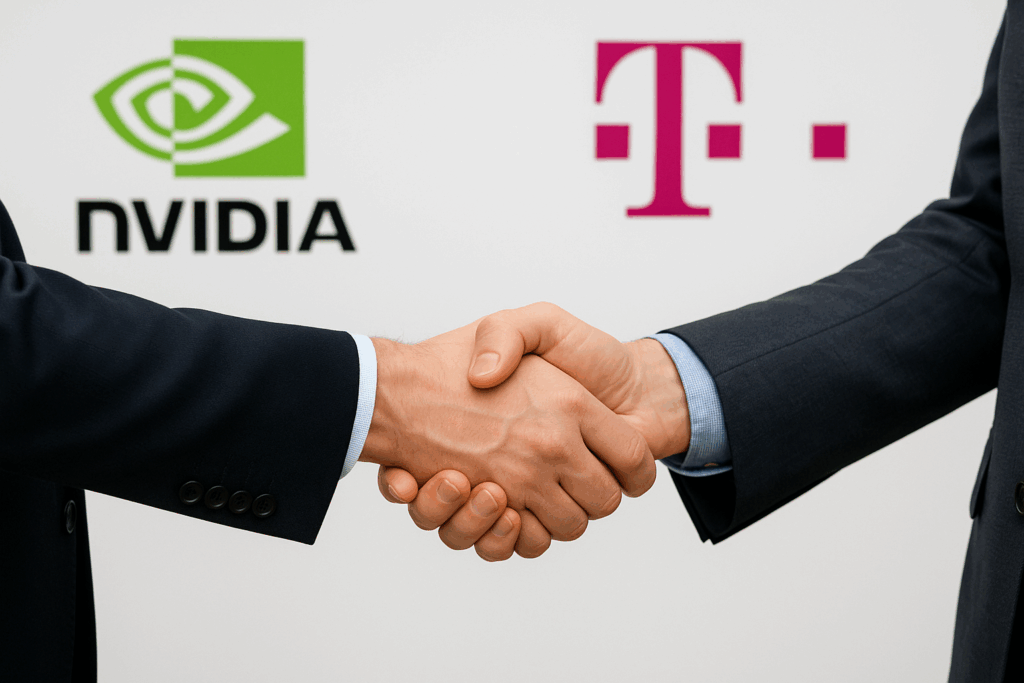Germany has taken a defining step in its digital evolution through a €1 billion ($1.17 billion) partnership between Deutsche Telekom and Nvidia to create an industrial AI cloud near Munich.
Expected to go live in early 2026, the project will raise Germany’s AI computing power by 50%.
Using 10,000 Nvidia GPUs, it aims to give European companies a secure and local platform to train complex AI models, marking a shift toward digital self-reliance across the continent.
Strengthening Europe’s AI foundations
The industrial cloud will be based in a refurbished data centre outside Munich and will serve as a backbone for Europe’s AI infrastructure.
Deutsche Telekom will oversee the network operations, while Nvidia provides its cutting-edge processors to run demanding industrial and enterprise applications.
The project’s goal is to reduce dependence on foreign cloud providers and to strengthen Europe’s ability to handle large-scale AI workloads securely within its borders.
The launch event in Berlin featured Nvidia CEO Jensen Huang and Deutsche Telekom CEO Tim Höttges, along with senior executives from SAP and Deutsche Bank.
Their participation reflected a coordinated national effort to bring together telecom, finance, and enterprise technology under one AI framework.
SAP will integrate its business technology platform to automate corporate systems and enable large-scale adoption of AI tools.
Germany’s contribution to the EU’s €215 billion AI plan
This development forms part of the European Union’s broader €215 billion strategy to expand AI capacity and triple computing power across the bloc.
The EU plan is progressing slowly, weighed down by funding reviews and regulatory approvals, but the German project represents one of its first major operational milestones.
Although smaller than the upcoming Texas facility by SoftBank, Oracle, and OpenAI, which will host around 500,000 GPUs, the Munich project holds strategic weight.
It reflects Europe’s intent to retain control over its digital infrastructure and to ensure compliance with the region’s strict data governance standards.
Rather than competing on size, Germany’s approach focuses on sovereignty, scalability, and data protection.
Nvidia’s growing influence in European technology
For Nvidia, the collaboration strengthens its position as a cornerstone of global AI infrastructure.
The company’s hardware already powers nearly every large-scale AI platform worldwide, and this project extends its reach into Europe’s industrial and corporate networks.
For Deutsche Telekom, the initiative signals a strategic pivot beyond telecommunications toward cloud computing and AI-driven enterprise solutions.
It reflects a wider shift among European firms seeking to modernise their business models for the AI age.
A model for digital sovereignty
The AI cloud in Munich stands as both a technological and political project.
It is designed not only to boost processing power but to redefine Europe’s relationship with data, computation, and control.
By 2026, the facility is expected to serve thousands of industrial and research clients, enabling them to deploy generative AI, automation, and predictive analytics without sending data abroad.
Germany’s decision to build this infrastructure with Nvidia encapsulates Europe’s drive to achieve strategic autonomy in technology.
It represents a collective ambition to secure the continent’s digital future through innovation built at home, under its own laws, and on its own servers.
The post Nvidia, Deutsche Telekom forge a $1.17B AI alliance appeared first on Invezz



